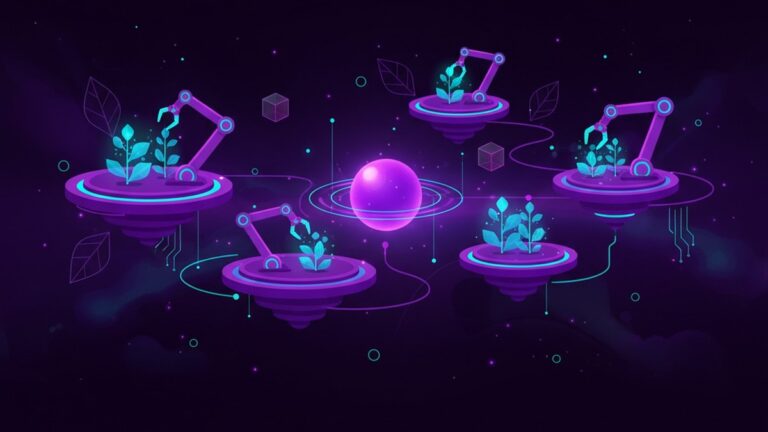In a groundbreaking move, Peaq, a prominent name in the decentralized technology space, has launched its pioneering tokenized robo-farm in Hong Kong. This innovative project promises to revolutionize urban agriculture by integrating blockchain technology with automated indoor farming, potentially setting a new standard for food production and distribution. As cities around the globe grapple with space constraints and sustainable food sourcing, Peaq’s venture could be a game-changer.
A New Era in Urban Farming
Peaq’s robo-farm is not just any farming project; it signifies a shift towards highly efficient, technology-driven agriculture. Nestled in the bustling urban landscape of Hong Kong, the stacked indoor farm employs advanced robotics to optimize plant growth and yield. The key differentiator? Its operations are intricately linked to the blockchain, offering a transparent and decentralized approach to farming.
The farm utilizes a vertically stacked system, maximizing use of space and enabling year-round cultivation of various crops. Coupled with sophisticated automation, from planting to harvesting, this method ensures optimal resource use and minimal waste. It’s a strategic response to the limitations of traditional farming, especially in urban settings where land is scarce and expensive.
Tokenization and Revenue Sharing
What truly sets Peaq’s initiative apart is its integration with the peaq network, which employs blockchain technology to tokenize farm operations. This approach allows individuals to invest in the farm through NFTs (non-fungible tokens), which represent shares in the farm’s output and revenue. Token holders will receive a portion of the profits, effectively democratizing access to agricultural investments.
For instance, an NFT might correspond to a specific section of the farm or a particular crop cycle. As the farm’s produce is sold in the market, the revenue is proportionately distributed to NFT holders. This model not only incentivizes investment but also aligns the interests of the farm operators and investors, fostering a community-driven approach to farming.
Advantages of Decentralized Farming
The benefits of Peaq’s tokenized robo-farm are multifaceted. For starters, it enhances transparency and trust. By utilizing blockchain, every transaction, from crop sales to revenue distribution, is recorded and immutable. This level of transparency ensures that investors can track their investments and verify the farm’s performance without relying on intermediaries.
Moreover, the automated nature of the farm reduces labor costs and increases efficiency. With robots handling the day-to-day farming tasks, human error is minimized, and productivity is maximized. This could lead to lower prices for consumers and higher margins for investors, creating a win-win scenario.
Challenges and Criticisms
Despite its promising potential, Peaq’s project isn’t without challenges. Critics argue that the high initial costs associated with setting up such advanced systems could be prohibitive, limiting widespread adoption. Additionally, the reliance on technology raises concerns about system failures and data security, issues that could undermine investor confidence.
There’s also the question of market acceptance. While blockchain enthusiasts and tech-savvy investors might eagerly participate, traditional investors and consumers may be cautious, preferring tried-and-true methods over unproven technological innovations.
The Broader Impact on Urban Agriculture
Peaq’s venture could have far-reaching implications beyond Hong Kong. As more cities face the dual challenges of feeding growing populations and managing environmental impacts, tokenized robo-farms could offer a viable solution. By leveraging technology and community investment, urban areas might become less dependent on external food sources, enhancing food security and sustainability.
Furthermore, this model could inspire similar projects, encouraging innovation in agricultural practices worldwide. As urbanization continues to rise, integrating technology into farming isn’t just an option—it’s becoming a necessity.
Looking Ahead
Peaq’s tokenized robo-farm marks a significant step forward in the evolution of urban agriculture. By merging blockchain technology with automated farming, the project not only addresses immediate challenges but also sets a precedent for future developments in the field. While there are hurdles to overcome, the potential rewards for investors, consumers, and the environment are substantial.
As this project unfolds, it will be crucial to monitor its impact and adaptability. If successful, Peaq’s initiative could redefine how cities approach food production, paving the way for a more sustainable and equitable future. Whether it’s a passing trend or a lasting transformation, the world will be watching Hong Kong as it becomes the testing ground for this bold new approach to farming.

Steve Gregory is a lawyer in the United States who specializes in licensing for cryptocurrency companies and products. Steve began his career as an attorney in 2015 but made the switch to working in cryptocurrency full time shortly after joining the original team at Gemini Trust Company, an early cryptocurrency exchange based in New York City. Steve then joined CEX.io and was able to launch their regulated US-based cryptocurrency. Steve then went on to become the CEO at currency.com when he ran for four years and was able to lead currency.com to being fully acquired in 2025.


